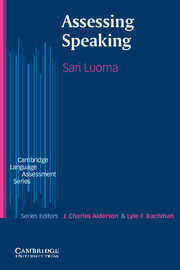Summary
Speaking scores express how well the examinees can speak the language being tested. They usually take the form of numbers, but they may also be verbal categories such as ‘excellent’ or ‘fair’. In addition to the plain score, there is usually a shorter or longer statement that describes what each score means, and the series of statements from lowest to highest constitutes a rating scale. In this chapter, I will discuss the nature and development of rating scales for assessing speaking.
Since speaking scales are composed of an ascending series of levels, they are in some sense related to second language acquisition (SLA). However, they are not a direct application of SLA research, because the objective in SLA studies has not been to construct rating scales and the results are not clear enough to describe levels of acquisition in detail. In fact, given the complexity of language ability in general and speaking as part of it, it is not even certain how far it is possible to find clear learning paths that most or all learners can follow. North (1996) describes the challenge of developing rating scales as ‘trying to describe complex phenomena in a small number of words on the basis of incomplete theory’. Furthermore, as Brindley (1998: 116) notes, it is not always easy to tell what scale descriptors are meant to describe – what learners ought to be able to do at each of the scale levels or what they do do.
- Type
- Chapter
- Information
- Assessing Speaking , pp. 59 - 95Publisher: Cambridge University PressPrint publication year: 2004



